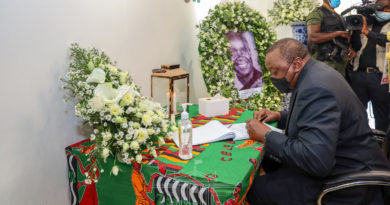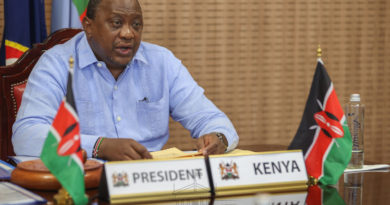Speech by President Uhuru Kenyatta during the “Ensuring Access to Lifesaving Medicines to End the Aids Pandemic by 2030” event in New Delhi, India
From president.go.ke
Ladies and Gentlemen,
Just about one month ago, we met at the United Nations General Assembly and agreed on seventeen (17) sustainable development goals, as part of the 2030 Agenda for Sustainable Development, that are crucial in “Transforming Our World”. At a side session, organized by the Republics of Kenya and Malawi, together with UNAIDS, I was challenged by a brave little Kenyan boy of 12 years living with HIV to make drugs available for the HIV treatment and to address stigma facing persons living with HIV. Elijah wants to be a scientist when he is 27 in 2030. He reminded us that he and many others can only achieve their dreams if we global leaders keep our promise and ensure continued access to lifesaving drugs.
It is for this reason that I wrote to my friend Modi, Prime Minister of India, to organize a side session at the India-Africa Forum Summit on sustainable access to affordable medicines for HIV and AIDS. Kenya, India and other African countries account for three quarters of 34 million persons living with HIV globally. 1.6 million Kenyans are infected with HIV, the fourth highest burden after South Africa, Nigeria and India. These populations represent the most valuable human capital and economic investment for the future of our nations. This requires Governments commitments to the attendant lifetime liabilities for drugs and commodities, recognizing that HIV is also an underlying condition for other health consequences including cancers, maternal and child deaths.
I commend India for its bold policies, not only in health but in other areas such as agriculture and food security. India’s skilled diplomacy in negotiating the “Trade Facilitation Agreement”, that seeks to reduce transaction cost and ease customs norms for global trade attest to this. In particular, African countries are benefiting from India’s global leadership in the primary production of generic medicines. With regard to HIV, we must remember that anti-retroviral treatment is for life and therefore we must think into the next 50 to 70 years.
Therefore, commodity security is a long-term investment. The costs of the HIV response are enormous. In 2012/13 Kenya’s expenditure on HIV was equivalent of 1.3% of country’s GDP. Africa is home to about 68% of the 34 million people living with HIV. Africa is also importing more than 80% of its antiretroviral drugs, mostly from India.
This, Ladies and Gentlemen, provides a primary imperative for developing a joint India-Africa cooperation framework on health commodity security, as part of an enhanced India-Africa partnership. I want to make three specific suggestions for such a framework. First, with the imminent changes for Indian manufacturers and an increasing number of African countries graduating to a middle income country status, such a framework needs to safeguard and extend the HIV related flexibilities under the trade and intellectual property rights. India, a long-standing proponent for the rights of least developed countries, could contribute by ensuring that trade agreements do not infringe on these flexibilities.
Secondly, while Africa’s pharmaceutical market is the fastest growing globally, and is expected to reach US$ 50 billion by 2020, Africa’s capacity for local production of medicines is still limited. Kenya, as in many African countries is adopting policies for incubation of local industries for commodities and pharmaceutical products. A framework focused on health commodity security, could facilitate local manufacturing capacity, and promote technology transfer for production of high quality medicines at competitive prices. Within the East African Community, we are investing in regulatory harmonization for drug assessment and registration. Kenya is taking the lead on pharmaceutical testing, utilizing its WHO prequalified laboratory, one of five in Africa. As these processes proceed, we urge India, to continue to produce generic anti-retroviral medication at the quantities required for the current rapid scale up of anti-retroviral medicine coverage until such a time that African pharmaceutical industry is fully developed.
Thirdly, we must secure front – loading investment to ensure that the AIDS response overtakes and outpaces the epidemic. Data, science and lessons from the HIV response, show us that we can eliminate HIV as a public health threat by 2030. Kenya is proud to have increased its domestic financing allocating 26 million dollars in 2015/16, primarily towards commodity security through purchase of anti-retroviral drugs.
I urge my fellow Heads of States to make immediate investments for HIV and health. Long-term options including providing HIV treatment as part of national health insurance, setting up HIV and health funds that will leverage government financing, fostering strategic private public partnerships are urgently required. As we make these investments, we urge our development partners to bridge the financing gap, in line with an agreed investment envelopes in order to foster more equal partnerships. Such global commitment with targets, investments and actions could well result in averting 28 million new infections and 21 million AIDS related deaths by 2030.
Ladies and Gentlemen, I have committed to Kenya becoming the third country in Africa to control its HIV epidemic after Botswana and Namibia. This requires concerted and smart actions, in particular for safeguarding sustained access to medicines. Kenya will be hosting the 10th Ministerial Conference of the World Trade Organization in December 2015. At the Conference, we will celebrate the 20th Anniversary of the World Trade Organisation. One of the key agenda items of the Conference is the long-pending Doha agenda, a matter of keen interest to Kenya, and also to India.
I trust that together we will effectively deal with issues relevant to intellectual property rights in addition to leveraging an enhanced and equitable India-Africa partnership. I wish to invite you for the side-session that the Government of Kenya will be hosting, to collectively explore alternatives to preserve the policy spaces for sustained access to affordable medicines and further innovation within the health sector.
I thank you all.



